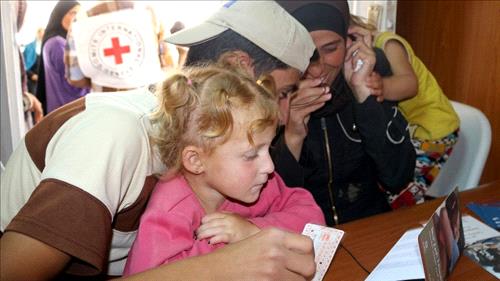Ammon News - AMMONNEWS - With no let-up in the crisis, people continue to seek safety by crossing from Syria to Jordan. The majority enter Jordan through the country’s north-eastern border area, where the scorching summer heat now adds to their misery.
“I was forced to travel dozens of kilometres through the desert with scarcely any food or water,” explains Um Hussein, a Syrian refugee from Damascus. “It took me around 48 hours to reach Jordan. The journey was exhausting.”
To address the needs of the refugees, the ICRC provides the arriving Syrians, who stay initially at four ICRC-supported transit facilities, with essential assistance, including daily cooked meals, drinking water, hygiene items and basic medical supplies. Meanwhile, in Tal Shihab, the ICRC supports a field hospital run by the Royal Medical Services to provide medical assistance to war-wounded Syrians.
Emergency aid
The ICRC provided Syrian refugees in Hadalat, Rukban, Bustana and Rweyshid transit facilities in the north-eastern border area with approximately 111,830 meals, 122,000 high-energy biscuit bars and 4,760 kilograms of dates.
The ICRC delivered around 6,240 bars of soap, 1,560 bottles of shampoo, 14,000 diapers, 12,000 sanitary pads and 300 jerry cans to the Syrian refugees in the four transit facilities.
Water and sanitation
The ICRC regularly provided cleaning services for tents, shelter caravans and sanitary facilities at Hadalat, Rukban, Bustana and Rweyshid transit facilities.
The ICRC regularly supplied treated water for drinking and domestic use at Hadalat, Rukban, Bustana and Rweyshid transit facilities and at the berm at Hadalat and Rukban.
With summer temperatures rising, the ICRC installed additional water tanks, doubling the number of storage facilities at the berm near Hadalat and Rukban. In addition, at all four transit facilities, the ICRC replaced the heaters with ventilation fans in all the tents and maintained the air conditioning units and electrical power generators.
The ICRC constructed roof shades and laid flooring at the three health posts, in Rukban, Hadalat and Rweyshid.
On 4 May, in North Badia, the ICRC and the Ministry of Water and Irrigation officially inaugurated their joint water projects. The ICRC followed up on the completed projects in the sites of Sabha, Rawdat Basma, Amra wa Omera, Mukifta, Bustanah, Deir Al Kahaf, Rweyshid and Al Hurra. The ICRC also improved the boreholes supplying the Rweyshid and Al Hurra water treatment plants.
At the Tal Shihab health post, the ICRC upgraded electrical facilities and provided vector control material.
Health
At the health posts offering services to Syrian refugees in Hadalat, Rukban, Bustana and Tal Shihab, the ICRC provided the Jordanian Royal Medical Services with medical supplies, medical furniture and technical support.
At the ICRC-run medical facility at Raba’a Al Sarhan Registration Centre in Mafraq, some 3,350 Syrian refugees received medical screening, some 1,000 of the refugees benefited from clinical services, and around 480 of the Syrians were transferred by ambulance to other health facilities.
The ICRC held 17 basic first-aid training sessions for 580 Syrian refugees in Zaatari camp and one such session for 20 individuals in Azraq camp.
The ICRC organized a “Pre-hospital Care Course” for 31 Syrian health-care providers involved in the management of casualties from the Syrian conflict. It also organized an “Emergency Room Trauma Course” for 18 members of local health facilities and international organizations, aiming to increase their emergency response capacity to meet the needs of sick and wounded Syrian refugees.
Restoring contact between family members
With support from Jordan Red Crescent Society (JRCS) volunteers, the ICRC offered free-of-charge international telephone calls so that around 8,000 Syrian refugees in Zaatari and Azraq camps could maintain contact with family members in Syria and elsewhere.
Around 370Syrian refugees entering Jordan were able to send urgent “safe-and-well” oral greetings to family members in Jordan, Syria and neighbouring countries.
The ICRC issued 77 travel documents to refugees granted resettlement in third countries.
Working in partnership with the JRCS
Some 3,135 Syrian refugees living in host communities in Mafraq and Madaba governorates received monthly cash assistance as part of an ICRC-JRCS programme.
The ICRC conducted three first-aid training sessions for 84 JRCS members.
Promotion of international humanitarian law
In May, with a view to raising awareness of and enhancing respect for international humanitarian law in times of war in Syria, the ICRC organized a three-day training session in Amman for organizations involved in the Syrian conflict. The agenda included matters related to the conduct of hostilities; protection of the civilian population, as well as health structures and personnel; management of dead bodies; and searching for missing persons.
In June, in the Zaatari camp in Mafraq, the ICRC organized a one-day dissemination session on the ICRC and the International Red Cross and Red Crescent Movement. Attending were 37 Syrian community leaders.
*ICRC
